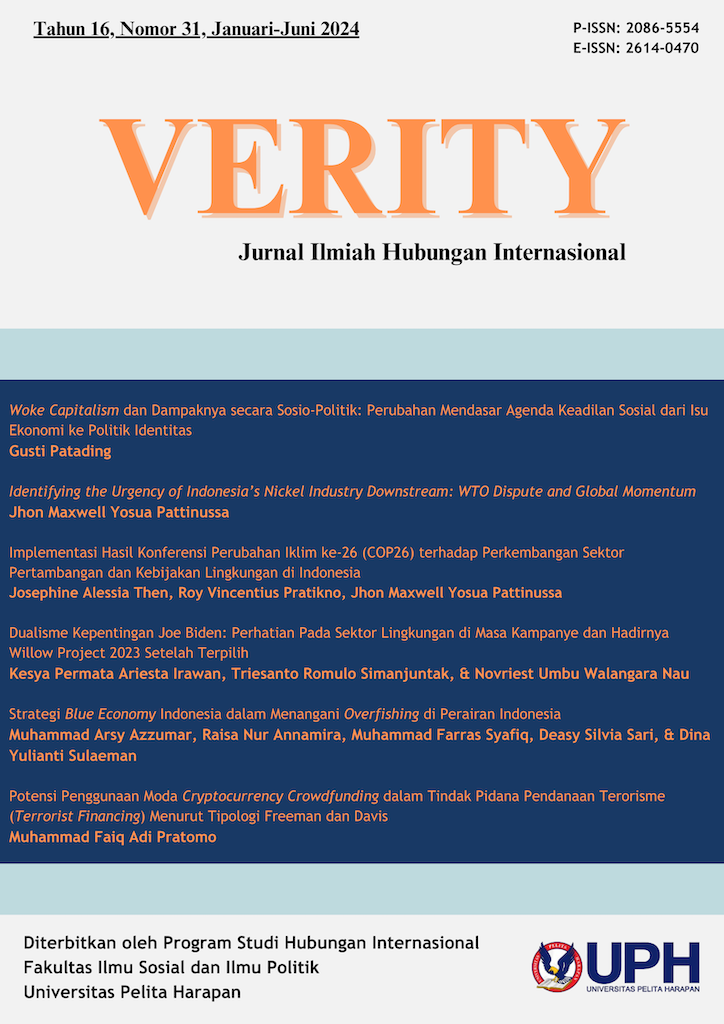Identifying the Urgency of Indonesia's Nickel Industry Downstream: WTO Dispute and Global Momentum [Identifikasi Kepentingan Hilirisasi Industri Nikel Indonesia: Sengketa WTO dan Momentum Global]
DOI:
https://doi.org/10.19166/verity.v16i31.8691Keywords:
Nickel, Downstream Policy, European Union, Lawsuit, IndonesiaAbstract
In recent years, Indonesia has been striving to vertically integrate its nickel industry. The primary reasons for this are technological advancements, the global momentum towards sustainability, and abundant nickel mineral resources. With 52% of the world's nickel reserves, Indonesia has undertaken the downstream policy of its nickel industry. Various policies have been created and implemented, including laws, government regulations, and ministerial regulations, to guide the downstream process. However, the European Union's lawsuit against Indonesia at the WTO has posed a significant challenge to this process. After being found guilty, Indonesia has appealed the EU's lawsuit. This research aims to identify the current state of the downstream process and the underlying interests behind Indonesia's ongoing appeal. Using qualitative research methods and focusing on explaining the downstream of the national nickel industry, this study seeks to uncover and elucidate the main agenda behind the urgency of Indonesia's nickel industry downstream amid the WTO dispute and global momentum in electronic vehicle era.
Bahasa Indonesia Abstract: Dalam beberapa tahun terakhir, Indonesia telah berupaya keras untuk mengintegrasikan industri nikel mereka secara vertikal. Alasan utama dibalik hal ini adalah kemajuan teknologi yang semakin pesat, momentum global yang semakin mengarah ke berkelanjutan, dan sumber daya mineral nikel yang berlimpah. Dengan memiliki 52% dari cadangan nikel dunia, Indonesia telah menjalankan hilirisasi dalam industri nikel mereka. Berbagai kebijakan telah dibentuk dan diimplementasikan untuk menuntun proses hilirisasi, termasuk aturan hukum, aturan pemerintah, dan regulasi tingkat menteri. Namun, tuntutan hukum Uni Eropa melawan Indonesia di WTO telah memberikan ancaman signifikan terhadap proses ini. Setelah divonis bersalah, Indonesia telah mengajukan banding terhadap tuntutan hukum Uni Eropa tersebut. Penelitian ini bertujuan untuk mengidentifikasi situasi terkini dari proses hilirisasi dan kepentingan tersembunyi di balik banding Indonesia yang sedang berjalan. Dengan menggunakan metode penelitian kualitatif dan berfokus pada menjelaskan hilirisasi dari industri nikel nasional, penelitian ini mencoba mengungkapkan dan menjelaskan agenda utama di balik urgensi hilirisasi industri nikel Indonesia yang berkaitan dengan sengketa WTO dan momentum global di era kendaraan listrik.
References
Agung, M., & Adi, E. A. (2022). Peningkatan Investasi dan Hilirisasi Nikel di Indonesia. Jurnal Ilmu Sosial dan Pendidikan (JISIP), 4009-4020. CNBC Indonesia. (2023, January 20). Gak Nyangka! Ternyata Ini Penyebab RI Kalah Gugatan di WTO. Retrieved from CNBC News Web site: https://www.cnbcindonesia.com/news/20230220092906-4-415187/gak-nyangka-ternyata-ini-penyebab-ri-kalah-gugatan-di-wto. Dwi Radhica, D., & Ambara Arya Wibisana, R. (2023). Proteksionisme Nikel Indonesia dalam Perdagangan Dunia. Cendekia Niaga Journal of Trade Development and Studies, 74-84. Fadlillah, S., & Wahyuni, K. T. (2023). Kajian Kebijakan Larangan Ekspor Bijih Nikel Indonesia (Study of Indonesia’s Nickel Ore Export Ban Policy). Seminar Nasional Official Statistics 2023, 611-622. Ferreira, R. (2021). The world nickel market in 2021 - Indonesia rising to the top. INSG. Hamowy, R. (1968). Adam Smith, Adam Ferguson, and the Division of Labour. Economica, 249-259. Herman. (2023, April 3). 35.862 Unit Mobil Listrik Bakal Dapat Diskon PPN di 2023. Retrieved from Web site Berita Satu: https://www.beritasatu.com/ototekno/1036242/35862-unit-mobil-listrik-bakal-dapat-diskon-ppn-di-2023. Hutabarat, G. F. (2023). Sengketa Ekspor Nikel Indonesia dengan Uni Eropa diWorld Trade Organization. Jurnal Ilmu Hubungan Internasional LINO, 116-122. International Nickel Study Group. (2022). The World Nickel Factbook 2021. International Nickel Study Group (INSG). Kementerian Keuangan Republik Indonesia. (2023, April 04). Pemerintah Luncurkan Insentif Pembelian KBLBB Roda Empat dan Bus untuk Akselerasi Transformasi Ekonomi. Retrieved from Kementerian Keuangan RI Web site: https://www.kemenkeu.go.id/informasi-publik/publikasi/berita-utama/Pemerintah-insentif-KBLBB. Kompas.com. (2021, March 5). Anak Tambang Merapat! 4 Perbedaan Proses Pirometalurgi dan Hidrometalurgi. Retrieved from Kompas Web site: https://www.kompasiana.com/indah91983/6041cfd6d541df0436576482/anak-tambang-merapat-4-perbedaan-proses-pirometalurgi-dan-hidrometalurgi#google_vignette. Krustiyati, A., & Surya, A. (2022). Sengketa Perdagangan Internasional Ekspor Bijih Nikel Antara Indonesia dan Uni Eropa. In E. Ramelan, Dinamika Hukum Sumber Daya Alam (pp. 122-133). Surabaya: Inara Publisher. Nieto, A. (2013). The Strategic Importance of Nickel: Scenarios and Perspectives Aimed to Global Supply. Beograd: Journal of Mining and Metallurgy Section B Metallurgy. OECD. (2024). Global value and supply chains. Retrieved from OECD Web site: https://www.oecd.org/en/topics/policy-issues/global-value-and-supply-chains.html. Prathama, J. P. (2020). Proses Hidrometalurgi Ekstraksi Nikel Menggunakan Bijih Laterit untuk Memproduksi MHP. Retrieved from Academia Web site. Pratikno, R. V., & Pattinussa, J. M. (2022). Food and Agricultural Product Industry as the Economic Defence for Indonesia's Covid-19 Economic Crisis. Verity, 69-81. Putri, R. d. (2022). Penyelesaian Sengketa Pemberhentian Ekspor Nikel Indonesia ke Uni Eropa oleh World Trade Organization. Jurnal Ilmu Sosial dan Humaniora, 46-62. Radhica, D. D., & Wibisana, R. A. (2023). Proteksionisme Nikel Indonesia dalam Perdagangan Dunia. Cendekia Niaga Journal of Trade Development and Studies, 74-84. Santika, E. F. (2023, April 27). Pemerintah Berambisi Bangun 53 Smelter pada 2024, Ini Rinciannya. Retrieved from Web site databooks: https://databoks.katadata.co.id/datapublish/2023/04/27/pemerintah-berambisi-bangun-53-smelter-pada-2024-ini-rinciannya. World Bank. (2024). Global Value Chains Participation in global value chains can lead to increased job creation and economic growth. Retrieved from World Bank Web site: https://www.worldbank.org/en/topic/global-value-chains#:~:text=With%20GVC%2Ddriven%20development%2C%20countries,%2C%20manufacturing%2C%20and%20services%20production. World Trade Organization. (2023). Global Value Chain Development Report 2023 Resilient and Sustainable GVCs in Turbulent Times. Beijing: Research Institute for Global Value Chains at the University of International Business and Economics.
Downloads
Published
Issue
Section
License
Copyright (c) 2024 Jhon Maxwell Yosua Pattinussa

This work is licensed under a Creative Commons Attribution-ShareAlike 4.0 International License.
Authors who publish with this journal agree to the following terms:
1) Authors retain copyright and grant the journal right of first publication with the work simultaneously licensed under a Creative Commons Attribution License (CC-BY-SA 4.0) that allows others to share the work with an acknowledgement of the work's authorship and initial publication in this journal.
2) Authors are able to enter into separate, additional contractual arrangements for the non-exclusive distribution of the journal's published version of the work (e.g., post it to an institutional repository or publish it in a book), with an acknowledgement of its initial publication in this journal.
3) Authors are permitted and encouraged to post their work online (e.g., in institutional repositories or on their website). The final published PDF should be used and bibliographic details that credit the publication in this journal should be included.


